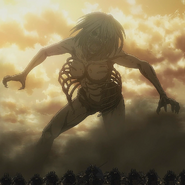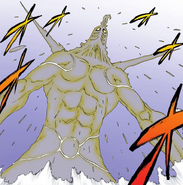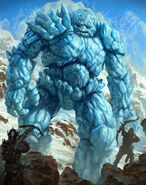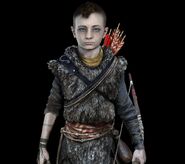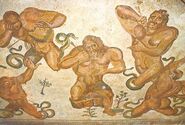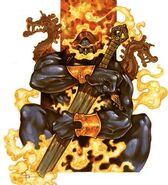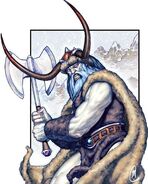The power to become a giant of godlike power. Supreme variation of Giant Physiology. Variation of Transcendent Physiology.
They tend to come in three varieties, the Primordial Giants (who created other Giant kin), the Transcendent Giant Mages (who favor using magic against their enemies) and the more "standard" Transcendent Giants (who fought largely with sheer brute force and ambition).
Also Called[]
- Giant-God Physiology
Capabilities[]
Users of this ability can gain the traits of a giant of godlike scale (or are one), these giants are immense creatures that embody aspects of nature or the cosmos and often stand in opposition to order, representing more primal and/or chaotic forces - though like their lesser giant cousins individuals vary immensely and thus they can range from malevolent, neutral or benevolent in nature.
Stories of such beings exist in countless folk tales, religions and media across the world - they differ from regular giants in the sheer immensity of their powers - for example Utgard-Loki was so powerful he could trick gods like Thor and Loki into performing cosmic feats of strength for his own amusement, having Thor wrestle Old Age itself, making Thor drink from the ocean via an enchanted cup and most infamous of all trapping Thor and Loki within his glove.
Entire races of such beings can exist such as the Titans, the Fomorians and the Jotunn - some Oni in Japanese folklore also gain godlike powers far beyond even the formidable power of regular Oni, in fiction godlike giants are even more popular and can be found in multiple fantasy games, shows and novels.
Perhaps one of the most striking examples of giants with godlike powers and ambitions in mythology comes in the form of the Gigantomachy, an event in which a group of giants known as the Gigantes waged open war against the Greco-Roman gods and took the battle to Olympus itself, the very home of the pantheon and a place normally seen as completely above the rest of the cosmology : while the Gigantes were unsuccessful they were unable to be killed by the gods and were cast instead under mountains, the phenomena of volcanoes and earthquakes were thus blamed on the imprisoned Gigantes.
Applications (General)[]
- Giant Divinity: As titans/giants form of dark divinity and divine powers granting them an immense amount of raw power beyond the mundane, making the giant divinity users divine beings by nature, a status which can be obtained several ways.
- Almost all Divine, Almighty, Holy, Spiritual Powers, Destructive Powers and
- Dark Miracle
- Deity Soul/Giant Soul
- Divine Aura
- Divine Conduit
- Divine Form/Giant Form
- Divine Force Manipulation
- Divine Magic/Magic Deity
- Divine/Unnatural Presence/Expanded Presence
- New God/Old God-Patron God
- Omicron Physiology
- Physical Godhood
- Power Inheritance
- Psionic Godhood
- Supernatural Condition/Absolute Condition/Pinnacle Condition
- Transcendent Physiology
Applications (Techniques)[]
- Indomitable Emotions: Especially rage and other primal emotions - so strong are the emotions of these giants that they may literally rage against the Heavens themselves (and often come close to victory).
- Giant Physiology/Giant Lord: User might have the ability to channel the powers of other giant types.
- Buggane Physiology
- Cyclops Physiology
- Demonic Giant Physiology
- Divine Giant Physiology
- Fachan Physiology
- Gegenees Physiology
- Giant Lord Physiology
- Giant Mage Physiology
- Hekatonkheire Physiology
- Jack-in-Irons Physiology
- Nephilim Physiology (originally in myth)
- Ogre Physiology
- Transcendent Giant Physiology
- Troll Physiology
Variations[]
- Primordial Giant Physiology
- Daityas Physiology
- Fomorians Physiology
- Gigantes Physiology
- Titan Physiology
- Hekatonkheire Physiology
- Jötunn Physiology
- Nephilim Physiology
Associations[]
Limitations[]
- May still rank slightly below full-fledged deities, depending on the setting.
- Usually can still die via extreme violence (divine slaying etc).
- Often depicted as cruel, chaotic or somewhat dim-witted compared to the true gods (though by no means universal, as some could outsmart the gods (such as Utgard-Loki) - in general however they were rather chaotic beings, just like the "lesser" Giants).
Known Users[]
Anime/Manga
- Gerard Valkyrie (Bleach); via "The Miracle"
- Users of the Founding Titan's power (Attack on Titan)
Mythology/Folklore
- Pangu (Chinese Mythology)
- Nephilim (Christianity)
- Gigantes (Greco-Roman Mythology)
- Alcyoneus
- Porphyrion
- Titans (Greco-Roman Mythology)
- Cronus
- Rhea
- Hyperion
- Atlas
- Oceanus
- Themis
- Coeus
- Tethys
- Ipateus
- Mnemosyne
- Phoebe
- Crius
- Theia
- Typhon (Greco-Roman Mythology)
- Hecatoncheires (Greco-Roman Mythology)
- Daityas (Hindu Mythology)
- Fomorians (Irish Mythology)
- Jötunn (Norse Mythology)
- Surtr
- Utgard-Loki
- Ymir
- Mimir
- Reiki (Japanese Mythology)
Roleplay
- Annam the All-Father (Dungeons & Dragons)
- Kostchtchie (Dungeons & Dragons)
- Surtur (Dungeons & Dragons)
- Thrym (Dungeons & Dragons)
Video Games
- Makers (Darksiders)
- Starkaðr (God of War)
- Atreus/Loki (God of War)
- Laufey/Faye (God of War: Ragnarök)
- Surtr (God of War: Ragnarök)
- Sinmara (God of War: Ragnarök)

